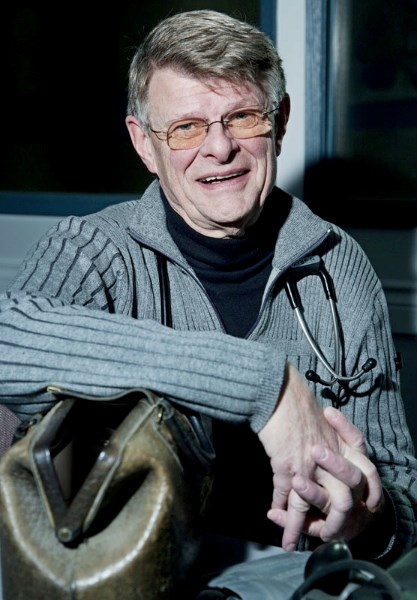During the four decades he worked as a family physician, Dr. Neil Gray's family vacations came few and far between, sometimes scheduled around patients.
One vacation, he recalls, was delayed until a patient had given birth.
"My wife and kids sat in front of the old Sturgeon hospital for six hours while I did the delivery and that was the first day of our holidays, I'm heading out the door. I should have called one of my colleagues but I knew this lady all the way through her pregnancy," he said on Tuesday, the second official day of his retirement from the Grandin Medical Clinic.
While the story shows Gray's unwavering commitment to his patients, it also illustrates how the health care system has changed since 1973, when he first began practising.
Although he said he knows many doctors today who would do anything for their patients, for the most part they aren't willing to work the 110 hours each week he did when he started working as a physician in Athabasca.
Back then, he made a lot of house calls with a weather-beaten medical bag in tow.
"We didn't have instant labs, we didn't have instant X-rays. They were important, but only for the more serious things," Gray said, adding house calls have largely fallen to the wayside due to scientific advances.
"I just think you lose the touch, you lose the trust that you've developed. Now you have to trust the system. A lot of people don't trust the system. I don't; you get lost."
Gray said there is a misconception about continuity of information and continuity of care in the health system and he worries information slips through the cracks.
"If you have a specialist one day and the next day you have another specialist, they're all specialists in the same field, but is there any danger that someone won't see the big picture?"
With the first wave of baby boomers turning 65 this year, Gray is also concerned with the province-wide shortage of family physicians, something he attributes to a decision to cut funding to medical schools in the 1970s and 1980s.
Back then health economists said the province had too many doctors and, as a result, the province cut the number of admissions to medical schools by 30 per cent, he said.
"So in the next five years we're going to see a third of our family physicians retiring. Where do we find them?" he said.
"I thought maybe the answer would be increasing education in all the other areas, getting nurses to work — they could do a lot of the work. It hasn't happened."
Even though the province has since returned medical school admissions to the level they were 15 years ago, the problem persists.
"We don't have enough doctors," he said. "It makes me concerned, who will look after me?"
Bye-bye baby
Looking back over his lengthy career, Gray estimates he has brought more than 2,000 people into the world.
"That was always the beginning of life, the beginning of all of us. It was always neat. People were always happy — those were happy times, most of the time."
In addition to his patients, Gray said he will also miss his co-workers at the Grandin clinic.
"They are just marvelous, they really bring everything with them to work. I can't say enough about them," he said.
Elecia Maksymetz, a registered nurse who worked with Gray for more than two decades said he was always very professional and made his co-workers feel like part of a team. She called Gray "selfless" and said he delayed his retirement until his patients had found new doctors.
"He will be deeply, deeply missed by the staff, all of us at Grandin Medical Clinic and by his patients. We wish him all the best," she said.
Carol Rashard, a receptionist at the clinic, recalled that Gray always took the time to listen to people.
"He was a compassionate kind of old-fashioned family doctor and he was a good listener. You didn't feel like he was putting you off if you had something to say to him," she said.
Since hanging up his stethoscope, Gray, who served as president of the Alberta Medical Association in the 1980s, has been able to enjoy the things he's missed out on during his career.
"We got our snowshoes out yesterday and actually went out during the day, instead of at night in the dark when you can't see, so that was fun," he said.
During 44 years of marriage, Gray said he and wife Linda, who have five children together, have never taken a vacation together.
"My father told me whatever I did in life, to get up and enjoy it and you'd have a roof over your head and you didn't have to worry about making money, as long as you knew how to work," he said.
"That's why it was so neat to work here, it was an opportunity to do what I enjoy."




